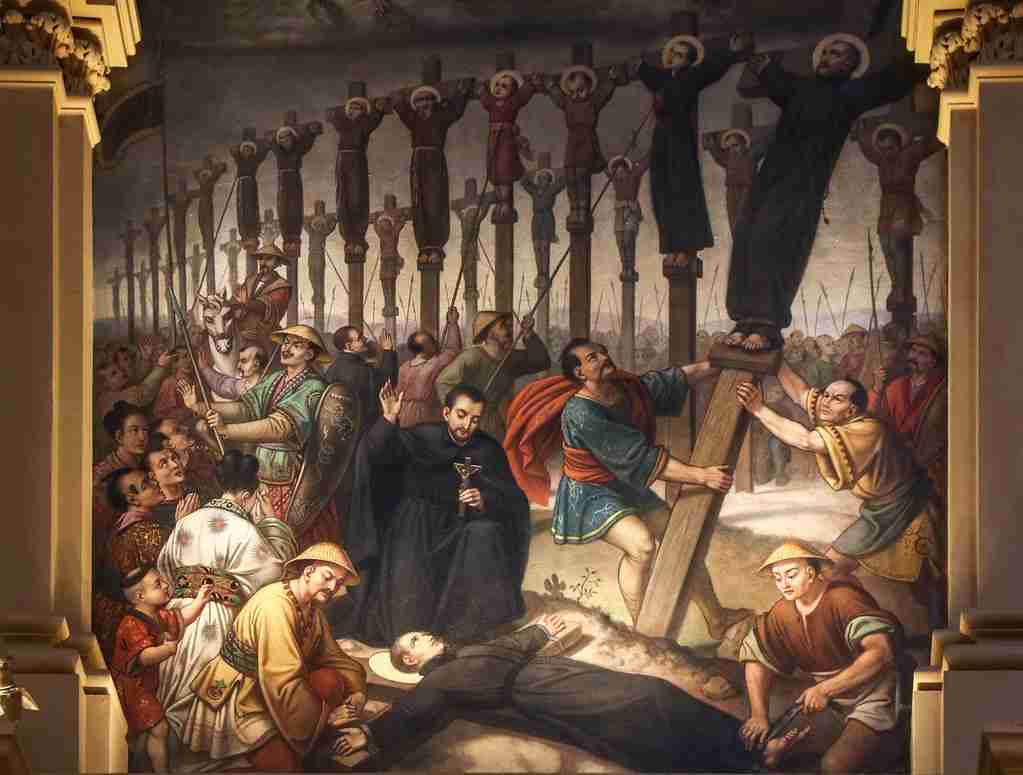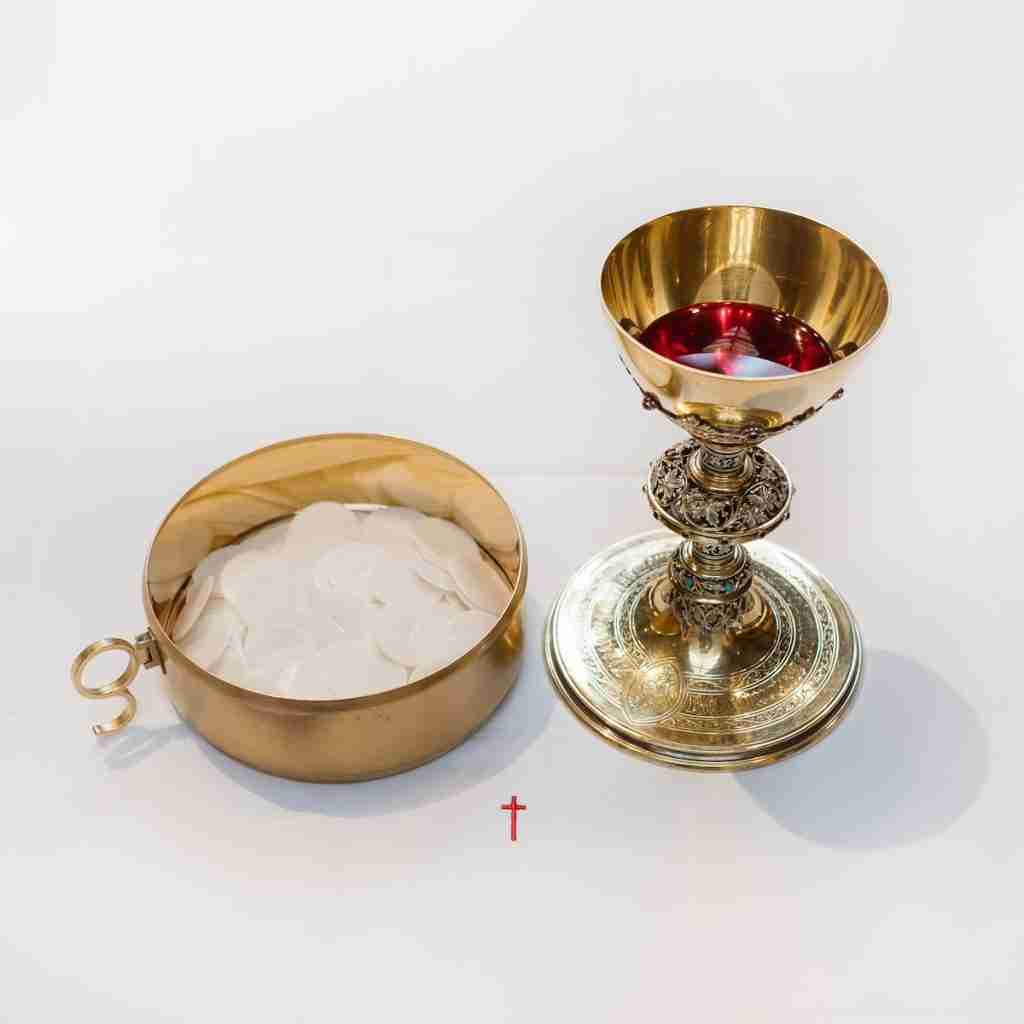25 Interesting Facts About Christianity: Tracing its History
1. Christianity started more than 2,000 years ago in Israel.
Over 2000 years ago in Israel, Christianity had its beginnings with Jesus, a Jewish teacher who introduced a fresh perspective within the Judaic tradition.
His teachings centered on the significance of love for God and for one another, delivering a transformative message of compassion and grace.
2. Christians believe in one God who is in three parts: the Father, the Son (Jesus Christ), and the Holy Spirit.
Christians believe in the concept of the Holy Trinity. The Father is often thought of as the creator of the universe.
The Son, Jesus Christ, is believed to have come to earth to save humanity.
The Holy Spirit is seen as a presence that guides, helps, and comforts people in their daily lives.
All three parts are distinct yet are the same God.
Christians believe that Jesus is the Son of God and that he died on the cross to save humanity from sin.
3. Christianity’s holy book is the Bible, which is split into the Old and New Testaments.
Christianity’s holy book, known as the Bible, is a fundamental guide for Christian faith and practices.
The Old Testament is a collection of books that includes the history of the Jewish people and the laws given to Moses. These laws are central to both Jewish and Christian ethical teachings which is one of the interesting facts about Christianity.
The New Testament, on the other hand, chronicles the life of Jesus Christ. It includes his teachings, miracles, crucifixion, and resurrection, which form the basis for the Christian faith.
4. The first Christian martyr was Stephen, who was stoned to death by a mob.

Stephen was the first Christian martyr in 36 CE, who faced death for his faith. He was one of the seven deacons appointed by the Apostles to help with the distribution of food.
Stephen was known for his preaching and miracles. When he openly criticized the Jewish authorities and their practices, he was stoned to death by an angry mob.
5. Christmas (December 25) is when Christians celebrate the birth of Jesus.
Christmas is a significant holiday for Christians worldwide. It symbolizes the arrival of Jesus, whom they regard as the Savior of humanity. Although it falls in winter for many, it is often associated with feelings of warmth and joy.
People typically observe this day with various customs, like attending church services, sharing meals with family, and giving gifts, all intended to spread love and goodwill.
6. Easter is a holiday that honors Jesus’ resurrection.
Easter is another important celebration for Christians. It commemorates Jesus’ return to life after his crucifixion, a sign of victory over death and sin. The exact date varies each year, but it’s usually in March or April.
The holiday often includes traditions like attending sunrise services, decorating eggs, and hosting festive meals with loved ones.
7. There are about 2.18 billion Christians worldwide.
One of the interesting facts about Christianity is that Christianity is widely recognized as one of the largest religions globally with around 2.18 billion adherents, Christianity has a vast global reach. This includes people from various cultural backgrounds, languages, and lifestyles.
They share a common belief in Jesus Christ, though they may follow different religious traditions or belong to other denominations, like Catholic, Protestant, or Orthodox.
8. Christianity has many branches including Catholic, Orthodox, and Protestant.

Christianity has a diverse range of branches, each with its unique traditions and beliefs.
The Catholic Church, led by the Pope, is the largest denomination.
Orthodox Christians, primarily in Eastern Europe, adhere to traditional practices and rituals.
Protestants, a group that emerged during the Reformation, emphasize individual faith and the authority of the Bible. Despite their differences, all branches share a belief in Jesus Christ.
9. Catholics believe the Pope, based in Vatican City, is the head of their church.
Catholics, based in Vatican City, look to the Pope as their spiritual head.
The Orthodox Church has a different structure, with an Ecumenical Patriarch serving as its leader.
Meanwhile, Protestantism operates differently. Rather than a singular leader, they emphasize the personal relationship each believer can have with God, placing focus on individual faith and interpretation of the Bible.
10. Christians believe Jesus performed miracles like healing the sick and walking on water.
One of the interesting facts about Christianity is that miracles are a significant part of the Christian faith, and Jesus is credited with performing numerous miraculous acts. He is said to have healed the sick, showcasing his compassion and power over illness.
One of the most well-known miracles is when he walked on water, demonstrating his authority over nature. These miracles are often seen as signs of Jesus’s divine nature.
11. Baptism is a ritual that signifies becoming part of the Christian faith.
Baptism is a crucial ritual in Christianity, marking a person’s official entry into the faith community. During this ceremony, a person is usually submerged in or sprinkled with water.
This act symbolizes spiritual cleansing and the start of a new life in Christ. It is a public declaration of faith and commitment to follow the teachings of Jesus.
12. The Holy Communion is a ritual where bread and wine are consumed, representing the body and blood of Jesus.

The Holy Communion, also known as the Eucharist or the Lord’s Supper, is a sacred tradition in Christianity. The bread and wine are symbolic of Jesus’s body and blood, respectively.
This ritual is a reminder of Jesus’s sacrifice on the cross. By partaking in Communion, Christians express their unity with Jesus and each other and renew their commitment to live according to his teachings.
13. Christianity spread through the Roman Empire, even though early Christians were often persecuted.
Christianity began as a small sect within the Roman Empire but gradually spread despite the frequent persecutions early followers faced. It was considered illegal and Christians were often subjected to harsh treatment.
However, their steadfast faith and the appeal of Christian teachings attracted more followers. Eventually, in the 4th century CE, Christianity became the official religion of the Roman Empire, significantly boosting its spread across Europe and beyond which is one of the Interesting Facts About Christianity.
14. Constantine the Great was the first Roman Emperor to convert to Christianity in the 4th century.
Constantine the Great is known for being the first Roman Emperor to convert to Christianity. His conversion was a significant event in Christian history.
Constantine not only ended the persecution of Christians in the Roman Empire, but he also declared Christianity a legal religion with the Edict of Milan in 313 CE. His support played a pivotal role in Christianity’s growth and acceptance.
15. The Bible was originally written in Hebrew, Aramaic, and Greek. It has been translated into many languages.
The original texts of the Bible were indeed written in Hebrew, Aramaic, and Greek. The Old Testament was primarily in Hebrew, with parts in Aramaic.
The New Testament was written in Greek. Since then, the Bible has been translated into many languages, making it accessible to people worldwide.
16. One of the Interesting Facts About Christianity is that the Bible contains 66 books for Protestants and 73 for Catholics.

The number of books in the Bible can vary depending on the Christian tradition. Protestants typically recognize 66 books in their version of the Bible: 39 in the Old Testament and 27 in the
New Testament. On the other hand, the Catholic Bible includes seven additional books in the Old Testament, known as the Deuterocanonical books, bringing their total to 73.
These additional books are considered part of the canon of Scripture by Catholics, but not by Protestants.
17. Christians believe that God created the world in seven days.
Christians base their belief in creation on the Genesis account in the Bible. According to this, God created the world and everything in it over six days.
Each day, God made different aspects of the universe, including the earth, sky, plants, animals, and finally humans.
On the seventh day, God rested, marking the completion of creation. This day of rest, known as the Sabbath, is observed by Christians as a day of worship and rest from regular work.
18. The cross is the main symbol of Christianity.
The cross holds immense significance in Christianity as it symbolizes the crucifixion of Jesus Christ. It is a reminder of Jesus’s sacrifice for humanity’s sins and his victory over death.
You’ll often see the cross displayed in churches, worn as jewelry, or used in artwork and literature. It serves as a powerful symbol of faith, redemption, and the central message of Christianity.
19. Christians believe in life after death, known as heaven or hell.
One of the interesting facts about Christianity is that Christians believe in life after death, with the faithful being rewarded with eternal life in heaven. Heaven is seen as a place of everlasting joy and closeness to God.
In contrast, those who reject God may face eternal separation in hell, characterized by suffering and the absence of God’s presence. The belief in the afterlife provides hope and shapes moral choices for Christians.
20. Some Christians choose to live as monks or nuns, focusing their lives on prayer.
Certain Christians opt for a monastic lifestyle, dedicating themselves to a life of prayer and spiritual devotion. These individuals, known as monks or nuns, typically live in secluded communities called monasteries or convents.
By renouncing worldly pursuits, they seek to deepen their relationship with God and pursue a path of spiritual enlightenment.
21. Christians believe Jesus will return to Earth in an event called the Second Coming.
Christians anticipate the Second Coming of Jesus, a future event when they believe Jesus will return to Earth. It is a fundamental belief that Jesus will come in glory and power to judge the living and the dead.
This event is seen as the culmination of God’s plan for humanity and the establishment of God’s eternal kingdom.
22. The word Christianity comes from Christ, meaning anointed one.
The term Christianity derives from Christ, which means anointed one in Greek. It refers to Jesus, whom Christians believe to be the promised Messiah and the Son of God.
The title Christ signifies Jesus’s role as the chosen and anointed Savior. Therefore, Christianity is centered around the teachings, life, and significance of Jesus Christ, the anointed one sent to bring salvation to humanity.
23. The Bible is the most widely read book in the world, with over 5 billion copies in circulation.
The Bible holds the distinction of being the most widely read book globally, with an estimated circulation of over 5 billion copies. Its influence extends across numerous cultures, languages, and denominations, reaching both religious and secular audiences.
Translated into numerous languages, the Bible is a source of spiritual guidance, moral teachings, and historical narratives for billions of people worldwide which is one of the interesting facts about Christianity.
24. According to the Bible, the birth of Jesus was a virgin birth by the action of the Holy Spirit.

According to the Bible, the birth of Jesus was indeed described as a virgin birth, an extraordinary event brought about by the Holy Spirit.
The Gospel of Matthew and the Gospel of Luke both recount the story of Mary, who was visited by the angel Gabriel and informed that she would conceive a child by the power of the Holy Spirit while remaining a virgin.
This miraculous birth is seen as a fulfillment of Old Testament prophecies and underscores the divine nature of Jesus as the Son of God.
25. Jesus was born in Bethlehem but grew up in Nazareth.
According to biblical accounts, Jesus was born in Bethlehem, a significant event celebrated as Christmas. After his birth, Jesus grew up in Nazareth, a town in the region of Galilee.
Nazareth is often referred to as Jesus’s hometown and is where he spent his formative years before beginning his public ministry.
FAQs
Christianity is a monotheistic religion centered around the life, teachings, death, and resurrection of Jesus Christ. It emphasizes faith in Jesus as the Son of God and Savior, offering redemption and eternal life. Christians believe in the Bible as their sacred scripture and strive to follow the ethical teachings of Jesus. It is one of the largest and most widespread religions in the world.
what is Christianity?
As of the latest available data, the world’s Christian population is estimated to be around 2.18 billion people. Christianity is followed by a significant portion of the global population, making it the largest religion worldwide. Christians can be found in various countries and encompass different denominations, including Catholicism, Protestantism, and Orthodoxy.
Jesus was born into a Jewish family and grew up in a Jewish community. During his time, Judaism was the predominant religious tradition in the region. Jesus and his early followers were considered Jews, and his teachings often drew from Jewish scriptures and traditions. However, Jesus’s teachings and his claim to be the Messiah led to the development of Christianity as a separate religious movement following his death and resurrection.
Jesus likely spoke Aramaic as his primary language. During his time, Aramaic was the common language spoken by the Jewish population in the region of Judea. This is evident from some Aramaic words and phrases that are preserved in the New Testament. Additionally, as a resident of the Roman Empire, Jesus may have also been acquainted with some Greek, a widely used language in that era.
Christianity believes in the existence of one loving and all-powerful God. It holds that Jesus Christ is the Son of God and the Savior of humanity, who offers salvation and forgiveness of sins through his death and resurrection. Christians believe in Jesus and that salvation is received through God’s grace. The Bible is considered the inspired Word of God and serves as a guide for faith and practice. Christians also embrace the concept of the Holy Trinity, understanding God as three persons in one. They anticipate life after death and hold the hope of eternal life in heaven through faith in Jesus.








